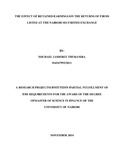| dc.description.abstract | This study sought to establish the effect of retained earnings on stock return of the
companies listed at the Nairobi Securities Exchange. The study followed a descriptive
study design and used secondary data obtained from Nairobi Securities Exchange and the
listed company’s annual reports for the period 2009 to 2013. The data was summarized
through excel spreadsheets and analyzed using Statistical Package for Social Sciences.
Regression analysis was conducted to obtain coefficient of determination (R), Correlation
Coefficient (R-Square), P-value and F-tests statistics to measure the possibility of a
relationship between the two variables. The analysis involved a regression of stock
returns against retained earnings alone, and then another regression involving retained
earnings and three more variables;Dividend Yield, Net Asset Value per share, Price to
Book Value acting as the control variables. When stock returns were regressed against
retained earnings the study established that; R, R- Square, P-Value and F-test statics were
0.054, 0.003, 0.361, and 0.838 respectively. With R and R-Square being 0.054 and 0.003
the results revealed that there is no relationship between the two variables. The regression
analysis involving inclusion of the three control variables established thatR, R-Square, PValue
and F-test statics was 0.282, 0.079, 0.000, and 6.042 respectively. With R and RSquare
being 0.282 and 0.079 the results revealed that there is a very weak relationship
between the variables. Further, the results revealed that a simple linear regression model
describing the relationship between stock returns and retained earnings was statistically
insignificant since the obtained P-Value was 0.361.Also, the results revealed that the
Multiple Linear Regression model which included the control variables was statistically
significant since the obtained P-value was 0.000. The obtained F-test statistic supported
the stance by the P-value. Nonetheless, in both cases, the results revealed that there exists
a very weak and insignificant relationship between retained earnings and stock returns
and the relationship is inverse since the coefficient corresponding to retained earnings in
the model was always negative. Also, P-value corresponding to retained earnings in the
model was 0.812; which was larger than 0.05 indicating that Retained Earnings was an
insignificant predictor of Stock Returns.Therefore, the study established that there is a
very weak (insignificant) inverse relationship between retained earnings and stock
returns. The study concluded that retention of earnings is irrelevant in influencing the
amount of stock returns earned byof the investors of NSE listed firms. Furthermore, their
relationship is insignificant and inverse.The study recommends that the corporate
organizations need not retain unnecessarily too much earnings as it inversely influences
the investors’ stock returns. They should retain earnings only when there are investment
projects with a positive net present value. Also, the study recommends that capital
markets authority and the NSE should put emphasis on the stance; that the NSE listed
companies should endeavor to create shareholder value in all their decisions including on
earnings retentions. That is, the NSE listed firms should retain earnings only when the
organization has projects with a positive net present value. | en_US |

